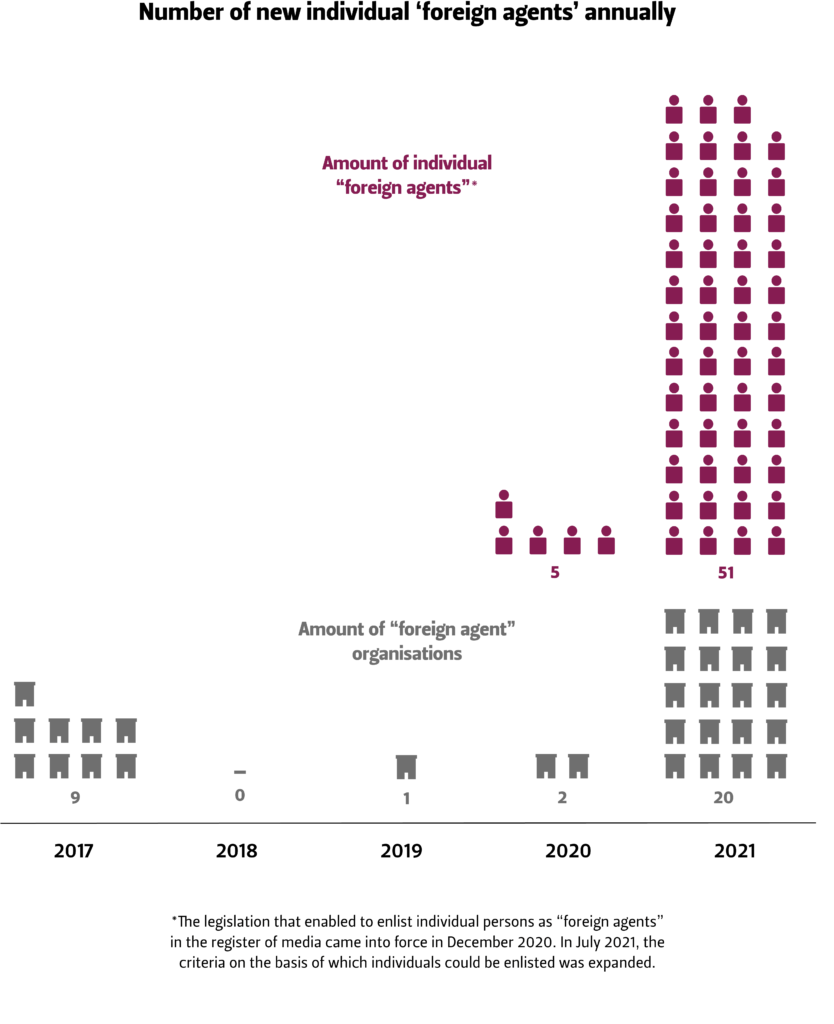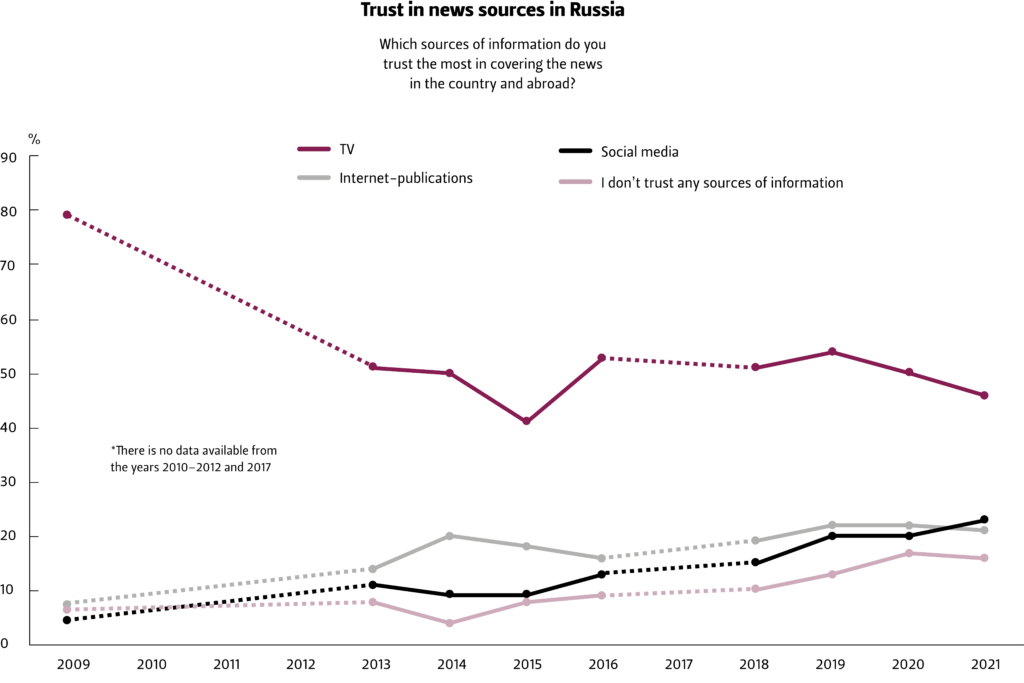Sammanfattning
Media control has been a key part of Vladimir Putin’s exercise of power. Recently, however, the repression of freedom of expression has taken both a quantitative and a qualitative turn for the worse. The political leadership now perceives independent media as a threat in itself, and is applying comprehensive control over media outlets and even individual journalists.
In particular, declarations about the media and journalists being ʻforeign agentsʼ have increased sharply. Such repression drives journalists and the media to leave the country. Internet-enabled journalism from exile has duly become an important part of independent media.
The growing importance of the internet, largely connected to Western platforms, and the diminishing role of state-run television in the face of multiple popular grievances, are key reasons for the regimeʼs accelerated repression.
Under these difficult circumstances, the readiness of internet giants to censor political content on the basis of their commercial interests further restricts the information space in Russia, and therefore needs to be resisted.
Introduction
On October 8, 2021, the Nobel Committee awarded the Peace Prize to Dmitri Muratov, editor-in-chief of the Russian independent newspaper Novaya Gazeta, who shared the honour with Filipino journalist Maria Ressa. As a symbolic gesture, awarding the prize to one of the pioneers of the Russian opposition media was significant, although it was overshadowed by doubts about caution. Giving the Peace Prize to Alexei Navalny, the Russian opposition leader currently serving a prison term, whose name had frequently featured in speculations, would have sent a much more embarrassing and politically stronger signal to the Kremlin. Muratov dedicated his prize to colleagues who had been killed because of their work since the early 2000s. On the same day, Russian authorities added 12 new names to the list of media and individual citizens who, they say, perform ʻforeign agentʼ activities.
In todayʼs Russia, what is left of media freedom remains defended by a small and oppressed community. Russiaʼs independent media and the freedom of the internet are facing increasingly systematic pressure and restrictions, forcing more and more media and journalists to close down their activities and/or operate abroad. Yet the mediaʼs digitalization and increasing independence from geographical locations provide opportunities for the continuation of free communication beyond Russiaʼs borders. On the one hand, the reason behind the regimeʼs growing pressure against freedom of expression lies in the transformation of the Russian media field in line with global trends, where traditional media – above all television – are constantly losing influence to the internet in managing the information space. On the other hand, controlling the information related to citizensʼ growing socio-economic grievances is becoming increasingly difficult on an internet largely attached to Western platforms. In this sense, the internet as a transnational global forum is seen as an increasing security threat by the authoritarian regime.
This Briefing Paper examines recent developments in the situation concerning freedom of expression in Russia, and the potential impact of Western actions in this sphere. It will argue that whereas the debate and actions around the establishment of the Kremlin-controlled sovereign internet have intensified, this development may be unintentionally reinforced by the tendency of Western internet giants operating on commercial logic to censor political content, also in democracies. Such actions further justify autocracies in tightening censorship of what they consider to be hostile content in their own country.
From ʻtightening the screwsʼ to comprehensive repression
After the pluralism of the 1990s, control over political, economic and media power has been a top priority for Vladimir Putinʼs rule since its inception. Along with political control of the independent oligarchs in the early 2000s, the largest independent television channels also came under the control of the Kremlin. In the winter of 2011–2012 a wave of protests swept across big cities in Russia, and open criticism towards the country’s political regime surfaced in Russian journalism.[1] After Vladimir Putin’s re-election to presidential office in 2012, the regime turned to more decisive measures to control traditional and online media, which resulted in this ʻtruth-telling phaseʼ in journalism becoming a thing of the past. Since 2012, the regime has restricted the share of foreign ownership of the media, introduced legislation on ʻforeign agentsʼ in the NGO sphere, and forced anonymous bloggers to register with the authorities, among other measures.
During the past year, the Russian regime’s repressive measures have taken yet another turn. The state authorities’ logic currently rests upon a different assumption: the media – or any civic activity – is no longer perceived as a vent that needs to be monitored and controlled, but rather as a direct threat to the stability of the country. A signal of that change was revealed in the protests demanding the release of Alexei Navalny in January 2021 when the state authorities’ open show of force was inflicted upon journalists too. More clearly, the change has been demonstrated in the ways in which legislation against ʻextremistsʼ, ʻundesirable organizationsʼ, and ʻforeign agentsʼ in particular has been applied to political activists and independent media. The scale has been unprecedented, especially during 2021 (see Figure 1).
The law on ʻforeign agentsʼ, originally drafted after the 2011–2012 protests to manage and control non-governmental organizations that were politically active, has gradually been extended since then. In 2017, the law was amended to also cover mass media organizations that enjoy foreign funding. Two years later, in 2019, individuals who receive money from abroad and who can be construed as performing the functions of mass media, for example because they reach a wide audience in social media, were also included in the definition of a ʻforeign agentʼ.[2]
In 2021, the scope of the law was again extended. Now, any individual citizen – and not only someone who could be treated as media – would need to register as a ʻforeign agentʼ if they were involved in ʻpolitical activityʼ and received money or support from abroad. This was a significant change to the previous versions of the law. The law had already been applied selectively before, but the latest amendment has made it possible to target practically any Russian citizen whom the state authorities wish to repress. The law obliges those organizations and individuals that appear on the authorities’ list to register as ʻforeign agentsʼ and to declare their sources of funding. If they fail to do so, they may face fines or – from 2021 onwards – even prison sentences.

Figure 1. Number of ‘foreign agents’ in the media sphere 2017–2021
At the time of writing, the list of ʻforeign agentsʼ in the media sphere encompasses 88 outlets, of which 56 are individual activists and journalists.[3] The flexibility of this law as a repressive instrument was again demonstrated in October 2021: the Federal Security Service published a list of topics, mainly related to unclassified military information, that could lead to people being designated as ʻforeign agentsʼ if they wrote about them.[4] In this case, the potential ʻagentsʼ would not need to have any international connections, as in previous versions of the law.
The development of the ʻforeign agentʼ law shows the Russian state authorities’ stance towards the media, first and foremost, as a tool in the global information war. With the goal of eliminating the ʻriskʼ that the independent media pose, the state has applied arbitrary repressive measures towards even the smallest media outlets. For example, in April 2021, the state authorities detained four editors of a student-run magazine called Doxa that had posted a video in support of Alexei Navalny’s protest movement. In general, the criminalization of Navalnyʼs network and its affiliates has been a key tool for the authorities to exclude numerous civil society actors from public life.
In short, at the beginning of the 2010s, the Russian authorities controlled media that they perceived as influential, either in terms of their resources or of the size of the audience they could reach. Today, no outlet is too insignificant to be repressed because the state logic is to ensure that every dissenting actor feels threatened. According to this logic, the repression is becoming more and more comprehensive while using its common arbitrariness as a key aspect as it aims at intimidating and eventually silencing all independent media.
Three consequences of repression for Russian media
Those media and journalists labelled as ʻforeign agentsʼ can still publish their work if they attach a disclaimer to it, at the behest of the authorities, stating that the content is produced by a foreign agent. Some media, such as online journal Meduza and TV channel Dozhd have chosen to do that, at least for the time being. However, in many cases, those working for repressed media may face criminal charges and risk being arrested. For example, Roman Badanin, editor-in-chief of investigative outlet Proekt, decided to move abroad after the outlet was declared ʻundesirableʼ and practically banned in July 2021. According to Badanin, there were plans to evacuate the rest of the staff ʻto one of the neighbouring countriesʼ. Nevertheless, in September the team launched a new outlet under the name Agency, which continues their work online.[5]
With the latest repressive measures, Russian media face three main consequences that will affect their work now and in the future: 1) relocation of media outlets and journalists abroad; 2) problems with funding, both domestic and foreign; and 3) limited coverage of certain topics. First, there has been increasing pressure for Russian journalists to leave the country and/or to work in exile.[6] This kind of relocation has profound consequences for the Russian media environment. Covering topics from a distance is, of course, more challenging, but maintaining credibility in the eyes of the Russian audience will also be a matter of renewed concern for those outlets working from abroad. While many media are relocating, the independent media still trying to work in Russia may find it even harder to justify and maintain even a marginal position in society.
Second, restrictions on the funding and resources of independent media have long been applied, but with the risks posed by ‘foreign agent’ legislation as well as the global transformation of media consumption, the challenges are amplified. Over the past decade, the Russian authorities have been particularly concerned about the foreign funding of media companies. In 2014, when the share of foreign funding in Russian media was planned to be cut to 20 per cent maximum, a representative of the journalists’ association in Moscow, Pavel Gusev, described the measure as ʻwholly adequateʼ in guaranteeing the country’s information security[7] – reflecting, at the same time, the divergent views on the function of journalism as a profession held by those working in the field in Russia. The source of funding is a central concern from the perspective of media freedom, not least because many journalists consider serving their employer a more significant value than that of serving their audience. Small independent outlets often rely on direct payments from their readers. However, this does not help them avoid being labelled a ‘foreign agent’, as the example of online journal Republic has shown. For the media listed as ‘foreign agents’, funding becomes a burning issue also because they need extra resources to fulfil the authorities’ administrative requirements. The scarcity of resources is a global puzzle as small companies struggle to secure funding for online content.
Third, the repressive mechanism is successful if journalists themselves stop seeking ʻtruthʼ, which has truly happened in many cases. Certain topics tend to fall off the radar when media outlets themselves sense the limits of tolerated content, which affects the media as a whole. The recent restrictions are aimed at eroding people’s trust in the media in general. However, as the ʻforeign agentʼ example shows, people may also have indifferent or ironic attitudes towards the label.
However, the process is not over, and its outcome cannot be fully predicted. Media scholar Natalia Roudakova stated in 2017 that journalism had been ʻmade superfluousʼ in Russia.[8] And yet, at the same time, as the information flows are global and cross borders easily, Russians have access to journalism produced elsewhere, which undermines the state control.
Towards a “sovereign” Russian internet
Russia is not a separate island in the global media dynamics, in which the role of traditional media has long diminished to the benefit of various internet platforms. Russiansʼ trust in television as an information source has been declining for more than a decade. Whereas in 2009, almost 80% of Russians said they trusted television, by 2021 the figure had dropped to 46%. Over the same period, overall confidence in the internet and social media has risen from around 10% to over 40%.[9]

Figure 2. Trust in TV, internet publications, and social media 2009–2021
The media landscape has pluralized. The internet does not represent a unified counterweight to the state television and the Kremlin has put a great deal of effort into its online presence. However, the regime no longer has the ability to manage the information space the way it did more than a decade ago.
Against this background, the authoritarian government’s deepening repression against the independent media becomes understandable. While extensive censorship of the critique has become impossible, the regimeʼs skills in relativizing critical information with different kinds of ʻwhataboutismʼ have not proved to be a sufficiently effective means of controlling the internet either. Moreover, even though citizensʼ widespread cynicism towards governmental corruption, among other societal ills, plays an important role in the Kremlin’s authoritarian resilience, the regime’s attempts to enhance its image in the current media situation also face deep indifference or even rejection.
To the extent that the Russian internet is widely connected to Western platforms, this picture is unlikely to change as long as citizens have access to the global internet and the means to transmit anonymized, censorship-free information there. For this reason, the issue of the closure of Western platforms in Russia, particularly Google-owned YouTube, has become increasingly relevant.
A significant turn in the struggle between the Western internet giants and the Russian authorities was seen in September 2021 when Google and Apple bowed to the demands of the Russian authorities. In the background was Alexei Navalny’s ʻSmart Votingʼ app, designed to instruct people to vote for the candidate most likely to win against a Kremlin candidate in single-mandate districts during the Duma election. Sites informing people about smart voting were blocked using the so-called ʻTechnical Means of Countering Threatsʼ, special technical equipment that internet operators are forced to use to block sites that are declared illegal. In addition to this, censorship was guaranteed by explicitly requiring key Western platforms to remove the Smart Voting app from their platforms. It is becoming self-evident that decision-making by the technology giants concerning restrictions on the flow of information is non-transparent and driven primarily by commercial interests.
The ever-expanding blocking of websites, as well as the closure of VPN services that allow users to circumvent blocking, have hindered the usability of the internet in Russia. Despite new technological means, hampering or shutting down a single Western platform will inevitably lead to a slowdown in the operation of numerous other platforms and sites, including government ones. This is possibly due to the fact that different internet providers in Russia have different numbers of customers behind the same IP address, and imposing a particular technological constraint does not work in the same way in different cases.
For this reason, the authorities have also put increasing pressure on Russian internet operators, which is also the aim of the ʻSovereign Internet’ Law that came into force in November 2019, obliging internet operators to connect to the National Domain Name System, which in turn makes it easier for the authorities to close banned sites. Many operators oppose this because they do not trust the functionality of the internet under the system. In late summer 2021, operators who refused were fined about 100,000 roubles (1,200 EUR). For the time being, many operators are more willing to pay a relatively modest fine than they are to comply with the demands of the authorities.[10] However, with the tightening internet control, fines are likely to increase along with other possible means of pressure.
Conclusion: How can democracies avoid complicity in repression?
It is important to recognize that authoritarian states like Russia continue to base their political legitimacy on formal democratic principles, that is, elections and freedom of expression. Modern technology makes it possible to maintain these formal principles, while they simultaneously help to strengthen the authoritarian control of society and regime survival. The internet and computer networks are becoming increasingly important in this process. For example, in the last Duma election, electronic voting, which played a significant role in guaranteeing the desired result for the regime, formally appears as a technological innovation that increases citizensʼ democratic participation. In practice, it makes independent election observation almost impossible.
Similarly, it has already become very clear that the Kremlin interprets its position as under threat by independent media actors whose work has been made possible by Western internet companies. From the Kremlinʼs viewpoint, it sees itself defending its right to ʻfreedom of speechʼ against the Westʼs ʻhostile information warʼ. Thus, it is no coincidence that the ʻSovereign Internetʼ Law justifies its necessity from the defensive viewpoint as follows: ʻIn the event of a threat to disconnect the national segment from the global internet, Russia can introduce centralized network managementʼ.
Democracies should not fall into this trap and give way to the politicized notion of democracy and freedom of speech constructed by the Kremlin. The proposals and actions on the censorship of disinformation by the Kremlin-related and affiliated media on Western internet platforms only add value to the regimeʼs demands and efforts to close these platforms in Russia. The principles, risks and benefits of such actions in the West should be assessed very critically. In this respect, YouTube’s decision to close two German channels of Russian state broadcaster RT, or the blocking of the relatively marginal Tsargrad TV channel from YouTube as a whole might become counter-productive.[11] Disinformation spread by the pro-Kremlin media is unlikely to pose a serious threat to the Westʼs political institutions, as far as its viewing figures are not particularly significant in terms of international comparison.[12]
The potential closure of Western internet platforms in Russia, however, is a much more dramatic and concrete threat to Russia’s remaining independent media and civil society. Instead of censoring disinformation, efforts should be put into the wider visibility of fact-based information. The most effective, and currently by far the only way the West can help and develop the remaining freedom in Russia and other authoritarian societies, is to avoid pushing internet companies towards censorship in their calculations of commercial interests. If these companies begin to see political content on their platforms as a commercial risk in democracies, it is to be expected that their threshold for conceding to demands from authoritarian regimes will also be lower. In such a case, authoritarian regimes are also unlikely to miss the opportunity to invoke Western practices in their demands and actions.
Endnotes
[1] See e.g. Roudakova, Natalia (2017). Losing Pravda: Ethics and The Press in Post-Truth Russia. Cambridge: Cambridge University Press, p. 211; Wijermars, Mariëlle & Lehtisaari, Katja: Introduction. In Wijermars, M. & Lehtisaari, K. (eds.), The Freedom of Expression in Russia’s New Mediasphere, 1–14, BASEES/Routledge Series on Russian and East European Studies, Routledge.
[2] Laine, Veera & Silvan, Kristiina (2021). ʻForeign Agent’ as an internal representative of ʻthe West’ in Russia’s geopolitical discourses. In J. P. Laine, I. Liikanen, & J. W. Scott (eds.), Remapping Security on Europe’s Northern Borders, 62–81, Routledge Borderlands Studies, Routledge.
[3] ʻReyestr inostrannykh sredstv massovoy informatsii, vypolnyayushchikh funktsii inostrannogo agentaʼ [Register of foreign mass media acting as foreign agents], Ministry of Justice of the Russian Federation, https://minjust.gov.ru/ru/documents/7755/.
[4] ʻFSB utverdila spisok svedeniy, za sbor kotorykh mogut priznat “inoagentom”’ [FSB approves list of information, the collection of which can lead to the identification of a ‘foreign agent’], Svoboda.org, 1 October 2021, https://www.svoboda.org/a/fsb-utverdila-spisok-svedeniy-za-sbor-kotoryh-mogut-priznatj-inoagentom/31487309.html.
[5] Tsvetkova, Maria (2021). ‘Investigative media outlet fleeing Russia to escape crackdown, editor says.’ Reuters.com, 29 July 2021, https://www.reuters.com/business/media-telecom/exclusive-investigative-media-outlet-fleeing-russia-escape-crackdown-editor-says-2021-07-29/; ‘Zhurnalisty priznannogo nezhelatel’nym v Rossii izdaniya “Proyekt” zapustili novoye SMI’ [Journalists on the ‘Project’ publication, designated as undesirable in Russia, launch a new media outlet], Forbes, 6 September 2021, https://www.forbes.ru/society/439107-priznannoe-nezelatel-nym-v-rossii-izdanie-proekt-perezapustilos-s-novym-nazvaniem.
[6] Polyakovskaya, Elena (2021). ‘“Pridumayu chto-to yeshche.” Zakrytyye media v Rossii, ikh vse bol’she’ [‘I’ll think of something else.’ Closed media in Russia, there are more of them] Svoboda.org, 5 August 2021, https://www.svoboda.org/a/otdohnu-i-pridumayu-chto-to-esche-zakrytye-media-v-rossii/31394848.html.
[7] ʻPredsedateli soyuzov zhurnalistov odobryayut ideyu ogranichit’ dolyu inostrantsev v rossiyskikh SMIʼ [Chairpersons of journalists’ unions approve of the idea of limiting the proportion of foreigners in the Russian media], Vedomosti, 17 September 2014, https://www.vedomosti.ru/politics/news/2014/09/17/predsedateli-soyuzov-zhurnalistov-odobryayut.
[8] Roudakova 2017, 219.
[9] ʻRossiyskiy medialandshaft 2021ʼ [Russian media landscape 2021], Levada Center press release, 5 August 2021, https://www.levada.ru/2021/08/05/rossijskij-medialandshaft-2021/.
[10] ‘Blokirovki VPN v Rossii’ [VPN blockings in Russia], Roskomsvoboda, 7 October 2021, https://roskomsvoboda.org/post/vpn-soprotivlenie-3/; ‘Domeniruyushcheye polozheniye’ [Dominant position], Kommersant, 31 August 2021, https://www.kommersant.ru/doc/4966108; ‘Zablokirovatʼ vse. Kak gosudarstvo voyuyet s “Umnym golosovaniyem” i chto s etim delatʼ [Block everything. How the state is fighting ʻSmart Votingʼ and what to do about it], OZI, 17 September 2021, https://ozi-ru.org/news/smartvote/.
[11] ʻSideswiped: Apple, Google, and the Kremlin’s Make-Believe Electionʼ, Carnegie, 23 September 2021, https://carnegieendowment.org/2021/09/23/sideswiped-apple-google-and-kremlin-s-make-believe-election-pub-85417; ʻRoskomnadzor prigrozil zablokirovatʼ YouTube za udaleniye kanalov RTʼ [Roskomnadzor threatened to block YouTube for removing RT channels], Radio Svoboda, 29 September 2021, https://www.svoboda.org/a/roskomnadzor-prigrozil-zablokirovatj-youtube-za-udalenie-kanalov-rt/31483615.html; ʻRussian TV channel ends talks with Google over YouTube blockʼ, Reuters, 16 August 2021 https://www.reuters.com/technology/russian-tv-channel-ends-talks-with-google-over-youtube-block-2021-08-16/.
[12] For example, the user statistics compiled by the Social Blade service on Russia Today’s performance on YouTube show that it is far behind Al-Jazeera or the BBC, https://socialblade.com/youtube/user/russiatoday; https://socialblade.com/youtube/user/aljazeerachannel; https://socialblade.com/youtube/user/bbc.


